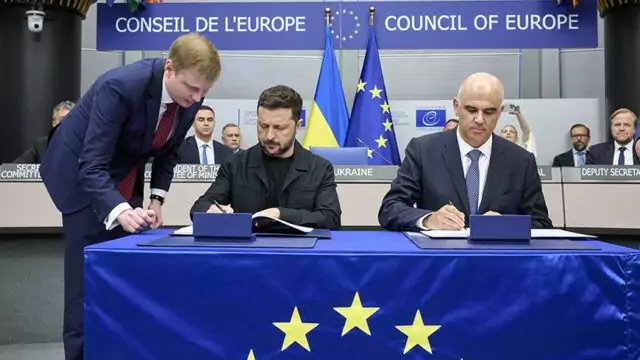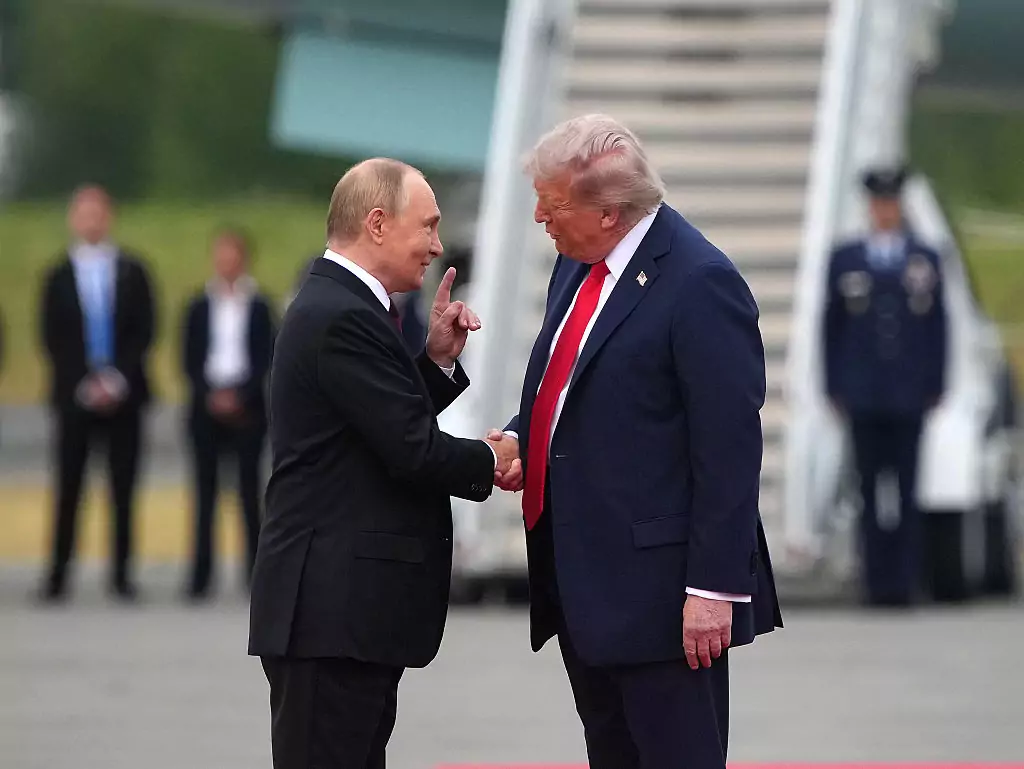
Ukrainians Work Toward Options for Post-War Justice
Ukrainians Work Toward Options for Post-War Justice
Executive Summary:
- Ukrainians are working on establishing practical steps toward post-war justice to further any meaningful opportunities for peace.
- These steps include agreements and funding on a future special tribunal, local initiatives to empower survivors and preserve the memory of victims, and the creation of dual citizenship laws to counter Russia’s forced passportization in Ukraine’s occupied territories.
- The Ukrainian government views accountability and justice as essential for any ceasefire agreements to avoid only a temporary pause in Russia’s war against Ukraine.
On October 13 in Kyiv, Kaja Kallas, EU high representative for Foreign Affairs and Security Policy and vice-president of the European Commission, announced an additional 10 million euros ($11.6 million) in funding to establish a special tribunal for the crime of aggression against Ukraine (Ukrainian Ministry of Foreign Affairs; New Voice of Ukraine, October 13; RBC-Ukraine, October 20). In June, the Ukrainian government and the Council of Europe signed an agreement to establish the Special Tribunal, which Ukraine expects to be operational in 2026 (Ukrainian Ministry of Foreign Affairs, Council of Europe, June 25; President of Ukraine, October 16). The agreement establishes a legal mechanism to prosecute senior political and military leaders for the crime of aggression against Ukraine (Council of Europe, accessed October 11). The Special Tribunal is a tangible effort by Ukraine and European states to prevent further violations and uphold the rule of law. As Ukrainian President Volodymyr Zelenskyy emphasized, “We need to show clearly that aggression leads to punishment, and we must make it happen together, across all of Europe” (Ukrainian Ministry of Foreign Affairs, Council of Europe, June 25).
For Ukrainians, justice means more than the mere end of fighting. Ukraine’s current peace framework is based on evidence collected by the Office of the Prosecutor General, through the national War Crimes Portal, of atrocities committed by Russian forces (Office of the Ukrainian Prosecutor General, accessed October 11). Complementing governmental efforts, parliamentary analytical work provides a roadmap for transitional justice processes focused on accountability, victims’ rights, and institutional reforms (Ukrainian Agency for Legislative Initiatives, March 7). The Ukrainian Parliament’s Commissioner for Human Rights monitors human rights violations and advocates for the protection of victims (Commissioner for Human Rights of the Verkhovna Rada, accessed October 11).
In early 2025, Zelenskyy publicly announced Draft Law No. 10425, aimed at introducing dual citizenship to strengthen Ukraine’s ties with its diaspora and counter Russia’s forced passportization policies in occupied territories (Verkhovna Rada, February 2). Draft Law No. 10425 was never formally submitted for parliamentary consideration, however, due to substantial overlap with a later draft, No. 11469, which explicitly addresses multiple citizenship and was introduced to the Verkhovna Rada in August 2024 (Verkhovna Rada, February 2). Legal experts and parliamentary sources confirm that the provisions in Draft Law 11469 effectively supersede those of 10425, which is why only the former proceeded through parliamentary readings (ExpatPro, accessed October 25). Both drafts aim to offer legal mechanisms for Ukrainians abroad—explicitly excluding voluntary acceptance of Russian passports—to protect national identity and citizenship rights (RBC-Ukraine, January 23, 2024). Russian occupation authorities continue the coercive issuance of Russian passports in Ukrainian-held territories, intensifying deportations and citizenship revocations, undermining local governance and complicating post-conflict reintegration (see EDM, September 3; Focus, September 8; Ombudsmann of Ukraine, accessed October 25). Forced conscriptions persist, with reports of unregistered individuals drafted into the Russian military under duress—a violation condemned as a serious breach of humanitarian law (ArmyInform, July 19).
As peace talks and diplomatic efforts offer meaningful opportunities for a truce and prisoner exchanges, many Ukrainians remain deeply skeptical of any peace arrangement not explicitly grounded in justice and the full restoration of sovereignty. Polling by the Razumkov Centre found that almost 78 percent of Ukrainians opposed any settlement recognizing Russian control over occupied territories (Razumkov Centre, March 21). Various surveys and institutional reports indicate strong public support for justice and accountability, with calls for comprehensive trials, reparations, and the safe return of deported children. The Center for Civil Liberties emphasizes that justice in Ukraine must include trials for perpetrators, victim reparations, and addressing the grave issue of children forcibly removed to Russia (Center for Civil Liberties, February 29, 2024). While there is broad consensus on accountability, debates continue regarding the reintegration of occupied territories, with some advocating for reconciliation measures alongside prosecutions.
While a ceasefire could temporarily halt large-scale violence, recent history and current logic suggest that without robust deterrence and genuine justice, the risk of renewed war within the next five to ten years is high. This danger is widely recognized not only by Ukraine, which fears that concessions will merely buy Russia time to regroup and strike again, but also by the Russian Federation itself, which is wary that any pause would allow Kyiv to rearm and potentially reverse Russian territorial gains. From the Ukrainian perspective, justice encompasses accountability for war crimes, reparations for victims, restoration of rights, and institutional reforms to prevent future abuses. Ukrainian legal frameworks are evolving in parallel with ongoing prosecutions led by the Office of the Prosecutor General, which emphasizes a victim-centered approach and integrates lessons from international humanitarian law (International Bar Association, March 2). Ukraine has taken concrete official measures to pursue a just peace. In November 2024, it adopted Law No.4067, pioneering urgent interim reparations for survivors of conflict-related sexual violence (Global Survivors Fund, September 24, 2024). The government also created a national Register of Damage for citizens and businesses to document and claim losses (Council of Europe, September 12). Ukrainian courts actively prosecute war crimes, including systemic sexual violence and looting, with over 100 verdicts delivered in cases monitored by the Ukrainian Bar Association, which reported comprehensive judicial reviews covering 292 war crimes cases across ten regions (Ukrainian Bar Association, September 25). The Organization for Security and Co-operation in Europe (OSCE) highlights challenges in Russia-led show trials and stresses Ukraine’s ongoing pursuit of fair trials under international norms (OSCE, February 24).
Civil society complements these efforts, with figures such as Victoria Amelina, whose Orwell Prize-winning book “Looking at Women, Looking at War” chronicles women-led documentation of war crimes, survivor support networks, and cultural memorialization (PEN Ukraine, June 26). Local initiatives preserve the memory of victims and empower survivors through digital platforms and counseling programs (Kyiv Independent, May 13; Killed Culture Makers, accessed October 25). Non-governmental organizations (NGOs) such as ZMINA promote the restoration of rights and inclusion for displaced Ukrainians and those in occupied territories (ZMINA, July 1). These state and societal actions together form a robust framework advancing comprehensive justice in Ukraine.
Potential diplomatic breakthroughs involving territorial concessions or security guarantees must grapple with profound challenges rooted in Ukraine’s constitutional and societal framework. The Ukrainian Constitution, reaffirmed by the Constitutional Court in 2025, prohibits territorial concessions without popular approval, underscoring the inseparability of sovereignty and national identity (Ukrainian Constitutional Court of Ukraine, June 30). Ukraine’s national priorities emphasize justice, reconciliation, and societal recovery as inseparable elements of peacebuilding, as detailed in the Cabinet of Ministers’ 2025 Ukraine Recovery Priorities document (Ukrainian Cabinet of Ministers, February 28). Zelenskyy’s 10-point peace plan explicitly links restoration of Ukrainian sovereignty, war crimes accountability, reparations, and legally binding security guarantees as foundational to any sustainable peace agreement (President of Ukraine, November 2022). Ukraine’s legal, societal, and military resilience coalesce into its clear message for the international community. Support for peace must be entwined with justice and sovereignty if it is to endure.


